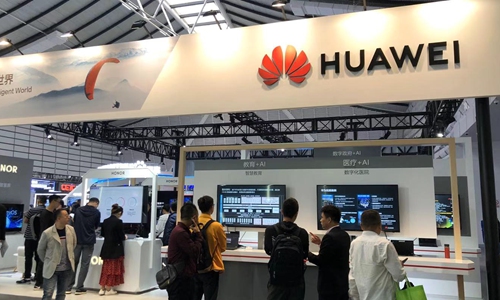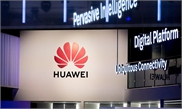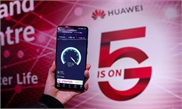
A view of Huawei's exhibition stand during the World Internet Conference in October 2019 Photo: Zhang Hongpei/GT
Huawei's launch of new products could be delayed if COVID-19 continues to spread abroad, which might lead to a disruption of international supply chains and shortages of key components that the Chinese tech giant will be difficult to replace, analysts said.
As domestic demand for handsets in the first two months plunged due to the virus outbreak, insiders said that Huawei may choose to eat profits and lower the price of the P40 5G phone series, which is set to be released on March 26, to snatch a larger share in the highly competitive domestic market.
The comments came as cases of COVID-19 in Europe and the US continue to rise recently, leading to wider lockdowns and halted production. Although Huawei's key suppliers such as Qualcomm and Intel have not reported plans to shut down operations yet, industry insiders cautioned that a potential collapse could be huge to the Chinese tech company.
Huawei and other Chinese companies may be able to continue production for the next one or two months with the components accumulated in recent weeks, but if the virus could not be contained overseas, new product releases could be delayed, Fu Liang, a Beijing-based telecom industry expert, told the Global Times on Thursday.
"Huawei has been striving to localize as much as production as it could over the past year in the face of a potential US ban, but products provided by firms overseas are still hard to replace," Xiang Ligang, an industry analyst and a close follower of Huawei, told the Global Times on Thursday.
According to a report by Japanese research institute Fomalhaut Techno Solutions, among all the 1,631 components the Huawei P30 Pro has, only 15 are provided by US companies, but they account for as much as 16.3 percent of the cost. Another 869 are from Japanese firms, accounting for 23 percent of the total cost. Enterprises from the Chinese mainland provided 80 components, accounting for the highest value of 38.1 percent.
On Wednesday, a chip supplier of Huawei and Apple - Taiwan Semiconductor Manufacturing Company (TSMC) - reported a COVID-19 case, resulting in home quarantining of 30 others who had close contact with the employee.
Although TSMC said that the case would not "impact company operations," industry insiders still warned of a "high risk" to the global smartphone industry chain. Industry reports say that Apple may not launch its highly anticipated 5G iPhones this fall.
"As a highly globalized industry, any problem along the industry chain could mean so much, not only to Huawei, but to all smartphone makers across the country," Xiang said, adding that
global logistics delays would be another problem if the situation got worse overseas.
As the domestic virus situation is abating in China, smartphone makers including Xiaomi and Vivo are ramping up efforts to resume production and domestic demand is also picking up.
Although February sales were hit by the virus outbreak, as of this month the entire industry has grown at a faster rate, and Vivo's sales increased by more than 10 percent over the same period last year, Vivo told the Global Times on Thursday.
"Prices of some upstream raw materials have already see signs of rising due to the spreading of the pandemic, while in the face of a very competitive domestic market, it's possible Huawei would lower its new product prices and 'give up' profits to win back customers and grab a larger share," Xiang noted.



